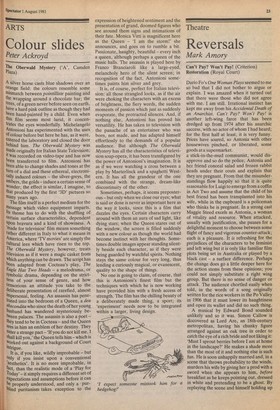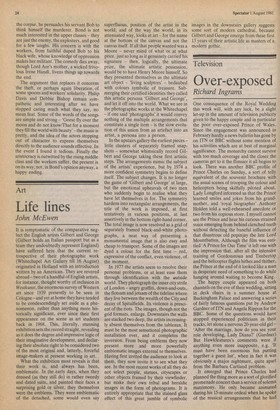Theatre
Reversals
Mark Amory
Can't Pay? Won't Pay! (Criterion) Restoration (Royal Court) Dario Fo's One Woman Plays seemed to me so bad that I did not bother to argue or explain. I was amazed when it turned out that there were those who did not agree with me. I am still. Irrational instinct has kept me away from his Accidental Death of an Anarchist. Can't Pay? Won't Pay! is another left-wing farce that has been dredged up from 1974 after his anarchic success, with no actor of whom I had heard; for the first half at least, it is very funny. Prices have soared, so Antonia with other housewives pinched, or liberated, some goods at a supermarket.
a stick-in-the-mud communist, would disapprove and so do the police; Antonia and her friend conceal salad and frozen rabbit heads under their coats and explain that they are pregnant. From that the misunderstandings flow happily so that it is quite reasonable for Luigi to emerge from a coffin in Act Two and assume that the child of his best friend has been transplanted into his wife, while in the cupboard is a policeman who thinks he is pregnant. In a strong cast Maggie Steed excels as Antonia, a woman of vitality and resource. When attacked, usually with justification, she pauses for a delightful moment to choose between some flight of fancy and vigorous counter-attack; each is a pleasure. It is refreshing for the prejudices of the characters to be feminist and left wing but it is only like familiar film plots being set in Australia or played by a black cast — a surface difference. Perhaps the change does go a little deeper here for the action stems from these opinions; you could not simply substitute a right wing group. But there is no sense of danger or attack. The audience chortled easily when told, in the words of a song originally written for the rice workers in the Po Valley in 1906 that it must lower its haughtiness and open its wallet and did no such thing.
A musical by Edward Bond sounded unlikely and so it was. Simon Callow is discovered as Lord Are, an 18th-century metropolitan, having his chunky figure arranged against an oak tree in order to catch the eye of a rich bride and not liking it: 'Must I sprout berries before I am at home in the landscape?' He makes a shade more than the most of it and nothing else is such fun. He is soon unhappily married and, in a scene that throws probability to the winds, murders his wife by giving her a prod with a sword when she appears to him, before breakfast as he keeps pointing out, dressed in white and pretending to be a ghost. By replaying the scene and himself holding up the corpse, he persuades his servant Bob to think himself the murderer. Bond is not much interested in the upper classes — they are just the enemy, the exploiters, and good for a few laughs. His concern is with the workers, from faithful duped Bob to his black wife, whose knowledge of oppression makes her militant. The comedy dies away, though Lord Are's mother, a wicked frivolous Irene Handl, livens things up towards the end.
The argument that replaces it concerns the theft, or perhaps again liberation, of some spoons and workers' solidarity. Philip Davis and Debbie Bishop remain sympathetic and interesting after we have stopped caring much what they say, no mean feat. Some of the words of the songs are simple and strong — 'Geese fly over the moon and do not know/That for a moment they fill the world with beauty' — the music is pretty, and the idea of the actors stepping out of character to express themselves directly to the audience sounds effective. In the event I found it tedious. Finally the aristocracy is outwitted by the rising middle class and the workers suffer, the present is on its way; not, in Bond's opinion anyway, a happy ending.



































 Previous page
Previous page